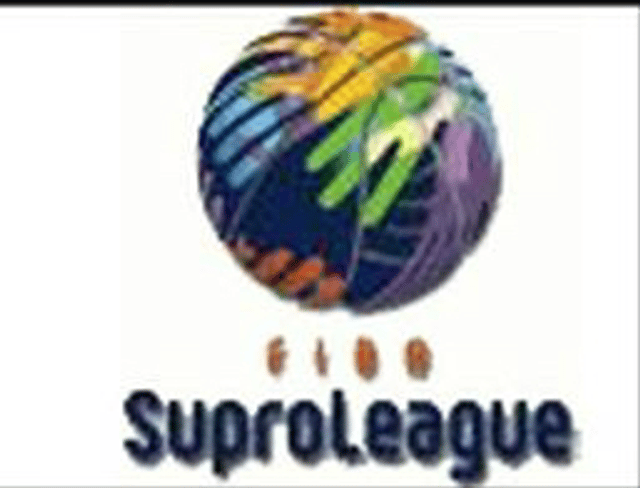2000–01 FIBA SuproLeague

2000–01 FIBA SuproLeague

The 2000–01 FIBA SuproLeague was the FIBA European professional club basketball Champions' Cup for the 2000–01 season. Up until that season, there was one cup, the FIBA European Champions' Cup (which is now called the EuroLeague), though in this season of 2000–01, the leading European teams split into two competitions: the FIBA SuproLeague and Euroleague Basketball Company's Euroleague 2000–01.
The season started on October 18, 2000, and ended on May 13, 2001. The competition's Final Four took place at Palais Omnisports de Paris-Bercy, in Paris, France.
European Champions' Cup teams divided
The EuroLeague (or historically called, the European Champions' Cup) was originally established by FIBA, and it operated under its umbrella from 1958, until the summer of 2000, concluding with the 1999–2000 season. Euroleague Basketball was created on 1 July 2000.
Because FIBA had never trademarked the "EuroLeague" name, Euroleague Basketball used it without any legal ramifications as FIBA had no legal recourse to do anything about it. Therefore, FIBA had to find a new name for their league and chose "SuproLeague". The 2000–01 season started with two separate top European professional club basketball competitions: the FIBA SuproLeague (previously known as the FIBA EuroLeague) and the brand new Euroleague.
The rift in European professional club basketball initially showed no signs of letting up. Top clubs were also split between the two leagues: Panathinaikos, Maccabi Elite Tel Aviv, CSKA Moscow, and Efes Pilsen stayed with FIBA, while Olympiacos, Kinder Bologna, Real Madrid, FC Barcelona, Tau Cerámica, and Benetton Treviso joined Euroleague Basketball.
Competition system and format
20 teams (national domestic league champions, and runners-up from various national domestic leagues), playing in a tournament system.
The first phase was a regular season, in which the twenty competing teams were drawn into two groups, each containing ten teams. Each team played every other team in its group at home and away, resulting in 18 games for each team. The top 8 teams in each group advanced to the Round of 16, and the winners of this round advanced to the Quarterfinals. Both of the rounds were played in a Best-of-three playoff system. The winning teams of the Quarterfinals qualified to the SuproLeague Final Four, which was held in the Palais Omnisports de Paris-Bercy, in Paris, on 10–13 May 2001.
Teams
Regular season
If one or more clubs were level on won-lost record, tiebreakers were applied in the following order:
Head-to-head record in matches between the tied clubs
Overall point difference in games between the tied clubs
Overall point difference in all group matches (first tiebreaker if tied clubs were not in the same group)
Points scored in all group matches
Sum of quotients of points scored and points allowed in each group match
| Top eight places in each group advanced to playoffs |
Round of 16
Quarterfinals
Final four
Bracket
Semifinals
May 11, Palais Omnisports de Paris-Bercy, Paris
3rd place game
May 13, Palais Omnisports de Paris-Bercy, Paris
Final
May 13, Palais Omnisports de Paris-Bercy, Paris
Awards
[[INLINE_IMAGE|//upload.wikimedia.org/wikipedia/commons/thumb/7/7e/Flag_of_Yugoslavia_%281992%E2%80%932003%29%3B_Flag_of_Serbia_and_Montenegro_%282003%E2%80%932006%29.svg/23px-Flag_of_Yugoslavia_%281992%E2%80%932003%29%3B_Flag_of_Serbia_and_Montenegro_%282003%E2%80%932006%29.svg.png|//upload.wikimedia.org/wikipedia/commons/thumb/7/7e/Flag_of_Yugoslavia_%281992%E2%80%932003%29%3B_Flag_of_Serbia_and_Montenegro_%282003%E2%80%932006%29.svg/35px-Flag_of_Yugoslavia_%281992%E2%80%932003%29%3B_Flag_of_Serbia_and_Montenegro_%282003%E2%80%932006%29.svg.png 1.5x, //upload.wikimedia.org/wikipedia/commons/thumb/7/7e/Flag_of_Yugoslavia_%281992%E2%80%932003%29%3B_Flag_of_Serbia_and_Montenegro_%282003%E2%80%932006%29.svg/46px-Flag_of_Yugoslavia_%281992%E2%80%932003%29%3B_Flag_of_Serbia_and_Montenegro_%282003%E2%80%932006%29.svg.png 2x|Serbia and Montenegro|h12|w23|thumbborder flagicon-img flagicon-img]] Miroslav Berić (Partizan)
[[INLINE_IMAGE|//upload.wikimedia.org/wikipedia/en/thumb/a/a4/Flag_of_the_United_States.svg/23px-Flag_of_the_United_States.svg.png|//upload.wikimedia.org/wikipedia/en/thumb/a/a4/Flag_of_the_United_States.svg/35px-Flag_of_the_United_States.svg.png 1.5x, //upload.wikimedia.org/wikipedia/en/thumb/a/a4/Flag_of_the_United_States.svg/46px-Flag_of_the_United_States.svg.png 2x|United States|h12|w23|thumbborder flagicon-img flagicon-img]] Nate Huffman (Maccabi Tel Aviv)
[[INLINE_IMAGE|//upload.wikimedia.org/wikipedia/commons/thumb/f/f0/Flag_of_Slovenia.svg/23px-Flag_of_Slovenia.svg.png|//upload.wikimedia.org/wikipedia/commons/thumb/f/f0/Flag_of_Slovenia.svg/35px-Flag_of_Slovenia.svg.png 1.5x, //upload.wikimedia.org/wikipedia/commons/thumb/f/f0/Flag_of_Slovenia.svg/46px-Flag_of_Slovenia.svg.png 2x|Slovenia|h12|w23|thumbborder flagicon-img flagicon-img]] Ariel McDonald (Maccabi Tel Aviv)
[[INLINE_IMAGE|//upload.wikimedia.org/wikipedia/commons/thumb/7/7e/Flag_of_Yugoslavia_%281992%E2%80%932003%29%3B_Flag_of_Serbia_and_Montenegro_%282003%E2%80%932006%29.svg/23px-Flag_of_Yugoslavia_%281992%E2%80%932003%29%3B_Flag_of_Serbia_and_Montenegro_%282003%E2%80%932006%29.svg.png|//upload.wikimedia.org/wikipedia/commons/thumb/7/7e/Flag_of_Yugoslavia_%281992%E2%80%932003%29%3B_Flag_of_Serbia_and_Montenegro_%282003%E2%80%932006%29.svg/35px-Flag_of_Yugoslavia_%281992%E2%80%932003%29%3B_Flag_of_Serbia_and_Montenegro_%282003%E2%80%932006%29.svg.png 1.5x, //upload.wikimedia.org/wikipedia/commons/thumb/7/7e/Flag_of_Yugoslavia_%281992%E2%80%932003%29%3B_Flag_of_Serbia_and_Montenegro_%282003%E2%80%932006%29.svg/46px-Flag_of_Yugoslavia_%281992%E2%80%932003%29%3B_Flag_of_Serbia_and_Montenegro_%282003%E2%80%932006%29.svg.png 2x|Serbia and Montenegro|h12|w23|thumbborder flagicon-img flagicon-img]] Dejan Bodiroga (Panathinaikos)
[[INLINE_IMAGE|//upload.wikimedia.org/wikipedia/commons/thumb/f/f0/Flag_of_Slovenia.svg/23px-Flag_of_Slovenia.svg.png|//upload.wikimedia.org/wikipedia/commons/thumb/f/f0/Flag_of_Slovenia.svg/35px-Flag_of_Slovenia.svg.png 1.5x, //upload.wikimedia.org/wikipedia/commons/thumb/f/f0/Flag_of_Slovenia.svg/46px-Flag_of_Slovenia.svg.png 2x|Slovenia|h12|w23|thumbborder flagicon-img flagicon-img]] Ariel McDonald (Maccabi Tel Aviv; Final Four MVP)[1]
[[INLINE_IMAGE|//upload.wikimedia.org/wikipedia/en/thumb/a/a4/Flag_of_the_United_States.svg/23px-Flag_of_the_United_States.svg.png|//upload.wikimedia.org/wikipedia/en/thumb/a/a4/Flag_of_the_United_States.svg/35px-Flag_of_the_United_States.svg.png 1.5x, //upload.wikimedia.org/wikipedia/en/thumb/a/a4/Flag_of_the_United_States.svg/46px-Flag_of_the_United_States.svg.png 2x|United States|h12|w23|thumbborder flagicon-img flagicon-img]] Anthony Parker (Maccabi Tel Aviv)
[[INLINE_IMAGE|//upload.wikimedia.org/wikipedia/commons/thumb/7/7e/Flag_of_Yugoslavia_%281992%E2%80%932003%29%3B_Flag_of_Serbia_and_Montenegro_%282003%E2%80%932006%29.svg/23px-Flag_of_Yugoslavia_%281992%E2%80%932003%29%3B_Flag_of_Serbia_and_Montenegro_%282003%E2%80%932006%29.svg.png|//upload.wikimedia.org/wikipedia/commons/thumb/7/7e/Flag_of_Yugoslavia_%281992%E2%80%932003%29%3B_Flag_of_Serbia_and_Montenegro_%282003%E2%80%932006%29.svg/35px-Flag_of_Yugoslavia_%281992%E2%80%932003%29%3B_Flag_of_Serbia_and_Montenegro_%282003%E2%80%932006%29.svg.png 1.5x, //upload.wikimedia.org/wikipedia/commons/thumb/7/7e/Flag_of_Yugoslavia_%281992%E2%80%932003%29%3B_Flag_of_Serbia_and_Montenegro_%282003%E2%80%932006%29.svg/46px-Flag_of_Yugoslavia_%281992%E2%80%932003%29%3B_Flag_of_Serbia_and_Montenegro_%282003%E2%80%932006%29.svg.png 2x|Serbia and Montenegro|h12|w23|thumbborder flagicon-img flagicon-img]] Dejan Bodiroga (Panathinaikos)
[[INLINE_IMAGE|//upload.wikimedia.org/wikipedia/en/thumb/f/f3/Flag_of_Russia.svg/23px-Flag_of_Russia.svg.png|//upload.wikimedia.org/wikipedia/en/thumb/f/f3/Flag_of_Russia.svg/35px-Flag_of_Russia.svg.png 1.5x, //upload.wikimedia.org/wikipedia/en/thumb/f/f3/Flag_of_Russia.svg/45px-Flag_of_Russia.svg.png 2x|Russia|h15|w23|thumbborder flagicon-img flagicon-img]] Andrei Kirilenko (CSKA Moscow)
[[INLINE_IMAGE|//upload.wikimedia.org/wikipedia/en/thumb/a/a4/Flag_of_the_United_States.svg/23px-Flag_of_the_United_States.svg.png|//upload.wikimedia.org/wikipedia/en/thumb/a/a4/Flag_of_the_United_States.svg/35px-Flag_of_the_United_States.svg.png 1.5x, //upload.wikimedia.org/wikipedia/en/thumb/a/a4/Flag_of_the_United_States.svg/46px-Flag_of_the_United_States.svg.png 2x|United States|h12|w23|thumbborder flagicon-img flagicon-img]] Nate Huffman (Maccabi Tel Aviv)
Two continental champions
In May 2001, Europe had two continental champions, Maccabi Elite Tel Aviv of the FIBA SuproLeague and Kinder Bologna of Euroleague Basketball Company's EuroLeague. The leaders of both organizations realized the need to come up with a new single competition. Negotiating from the position of strength, Euroleague Basketball Company dictated proceedings and FIBA essentially had no choice but to agree to their terms. As a result, the EuroLeague was fully integrated under Euroleague Basketball Company's umbrella, and teams that competed in the FIBA SuproLeague during the 2000–01 season joined it as well. It is today officially admitted that European basketball had two champions that year, Maccabi of the FIBA SuproLeague and Kinder Bologna of the Euroleague Basketball Company's EuroLeague.
Formation of the Euroleague
A year later, Euroleague Basketball Company and FIBA decided that Euroleague Basketball's EuroLeague competition would be the main basketball tournament on the continent, to be played between the top level teams of Europe. FIBA Europe would also organize a European league for third-tier level teams, known as the FIBA Europe League competition, while Euroleague Basketball would also organize its own second-tier level league, combining FIBA's long-time FIBA Saporta Cup and FIBA Korać Cup competitions into one new competition, the EuroCup. In 2005, Euroleague Basketball and FIBA decided to cooperate with each other and did so until 2016.
In essence, the authority in European professional basketball was divided over club-country lines. FIBA stayed in charge of national team competitions (like the FIBA EuroBasket, the FIBA World Cup, and the Summer Olympics), while Euroleague Basketball took over the European professional club competitions. From that point on, FIBA Saporta Cup and FIBA Korać Cup competitions lasted only one more season before folding, which was when Euroleague Basketball launched the EuroCup.
See also
2000–01 FIBA Saporta Cup
2000–01 FIBA Korać Cup